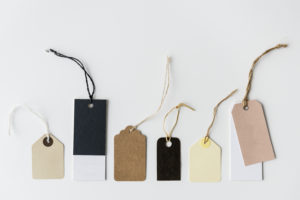
Labels. We are surrounded by labels. Our businesses depend upon labels: from demographics, to political affiliations, to fan likes. There is such a “niche market” today that we have become very label happy. Once we discover a new label, we are quick to apply that label liberally to anyone who might fit. And I totally get it. Labels help us make sense of the world around us and connect the dots. Labels don’t only convey an aspect of reality, they can, in fact, create reality. A label on a pair of jeans might not seem like much, but it ends up translating a social construct into real behaviors—which amount to real dollars and cents.
Labels are essentially categories. The original Greek definition of the word “category” comes from the word “kategoros” which means “accuser.” The Greek word “kategoria” meant “a statement or accusation.” Now, I understand that over time this word has evolved into a nicer more neutral word, but I wonder if there is something in the essence of the word category that subtly accuses others and undermines us as human beings.
Categories are like the little organizational boxes that we put things into when we are trying to make sense of all our stuff. If we are really organized, we wield that empowering label maker with glee, deciding which category to put all our little doodads and then shoving them in the appropriate drawers. It is a feeling of power and control that we get by creating a place for the things we own. It is even a way of setting boundaries with our stuff in order to dominate our stuff so that our stuff doesn’t dominate us. We are essentially “accusing” our pens of belonging where we want them to belong. We are making a “statement” about their identity. Our pens don’t mind if we categorize them by color or separate them from the sharpies or not. They don’t jump out of the boxes and say, “I don’t want to be labeled and put in this box here with all these sharpies!”
But people are another story. A large company of influencers in society have created categories for people in an effort to help us make sense of the world. I was elated when someone finally told me that I didn’t have to choose between being an introvert or an extrovert, but I could now become an “ambivert,” who is basically right in between an introvert and an extrovert. After jumping in and out of the “introvert/extrovert” categories, I realized that I could reject the two categories that were offered me and find solace in a third category. It never really occurred to me that I could reject the man-made categories all together.
We as people all want the ability to choose our own categories. Why? Because, counterintuitively, it gives us a sense of belonging. Some of us even reject obvious categories that are put upon us (ie: trying to not to be lumped in with our age peers and working ever so hard on a youthful appearance). It makes us feel powerful to deny even the most basic of categories, categories that are ordained by God and nature, not by man, such as the category of age.
Even as independent as we claim we are, we all want to fit into some type of people group even when, and especially when, that people group is marginalized or beaten down. In all our pain and rejection, we just want to know that we are not alone. And so we add another initial to the LGBT…. Or we create another diagnosis in the psychological textbook, another foundation to support another cause.
The downside of categories and labeling people is that human individuals are not really made for labels. Labels comfort us, but they also stifle us. They are the security blanket that claims we belong to someone or something. There have been people who have even killed themselves because they were living under a label that they could no longer endure. Every so often someone will lament, “Why can’t we just get rid of all the labels?” Well, we’ve tried but it hasn’t worked yet. Some of the people that say they reject labels the most are also the most adept at creating them. Take tattoos for an example. Tattooing is essentially an attempt to reject all previous labels and to express one’s own labels of choice, quite literally.
These days words as simple as “liberal” and “conservative” have become, not just descriptive, but so electrically charged that they evoke instant feelings of kinship or contempt depending on the audience. Assumptions are made instantaneously, and along with these assumptions come…you guessed it— accusations. Maybe there is something to that Greek etymology after all.
The ideological war we are engaging in begins with the art of conversation. In our conversations, I don’t pretend that we can get away from labels altogether, but I do think we need to take another look at how we are using them.
Using labels to ask someone how they would describe themselves is fine. As I said, I am now a self-proclaimed ambivert. I may be one, I may not be one–if in fact ambiverts really do exist at all. Nevertheless, it’s the word I’m choosing for now to define what I think about myself. So, what does one do with this information? Asking people clarifying questions as to what they mean by the use of the label is a helpful way to go, as it causes the person to examine the use of the label and it causes you to understand that person better. We always need to keep in mind that a label is only a feeble attempt to describe something.
Using a label to write someone off and end the conversation is counterproductive. Labeling someone while in the midst of a heated debate is also not helpful. Denying someone their equal voice in a discussion through the use of a label does nothing to move connection forward.
Talk about labels with your friends, coworkers and families. Use them if you need to describe something, but please don’t fall into the trap of using labels to accuse. Don’t use labels to control people just because you are uncomfortable grappling with the complexity of the person standing in front of you.
Also keep in mind that in this label-happy world, if you say anything of consequence, you will definitely be labeled. If people don’t know what to do with you, they will stick a label on you to make themselves feel better about your existence. But no matter what labels you choose for yourself, or no matter what labels others choose for you, only your Creator knows the truth about you. I hope you will begin a lifelong pursuit of your true identity and I hope that you will no longer live and die by the tyranny of the label.
